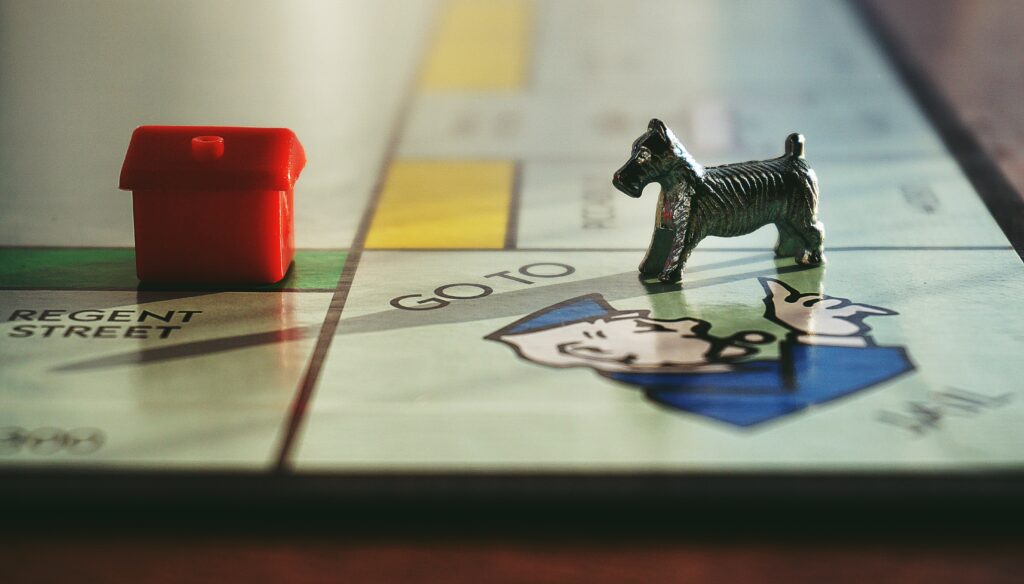Monopoly, a strategy board game that has entertained generations, offers players the chance to become the ultimate tycoon. With the goal of bankrupting opponents or accumulating the most wealth, players engage in a thrilling pursuit of property ownership, rentals, and sales. Suited for older kids and adults, the game accommodates 2-8 players. Its history traces back to the early 1900s when Elizabeth Magie designed a precursor called “The Landlord’s Game” to educate players on economic concepts. In 1933, the Parker Brothers released their version, which closely resembled the original. As players roll the dice, they navigate the board, accumulating money by passing “Go,” buying properties, and collecting rent. Building houses and hotels raises the stakes, increasing the rental rates. Spaces such as jail, free parking, and income tax bring additional challenges. The winner emerges as the player with the most wealth and assets, while bankrupt players succumb to their financial demise. Whether you’re seeking a stimulating mental challenge or a nostalgic trip down memory lane, Monopoly is sure to captivate players of all ages.
Monopoly: A Strategy Board Game for All Ages

Overview
Monopoly is a strategy board game that has been entertaining players for decades. With its objective of bankrupting opponents or accumulating wealth through property transactions, Monopoly remains a classic choice for game nights. This article will provide a comprehensive guide to playing Monopoly, covering everything from game setup and gameplay mechanics to special spaces and winning strategies.
Objective
In Monopoly, the objective is to bankrupt every other player or become the wealthiest player by buying, renting, and selling properties. Players compete against each other to strategically acquire properties, collect rent, and build houses and hotels to increase their income. The game challenges players to manage their finances, make calculated decisions, and negotiate with opponents to gain the upper hand.
Number of Players
Monopoly can be played by 2-8 players, making it suitable for larger groups and providing opportunities for social interaction. With more players, the game becomes more competitive, as players vie for limited resources and look for strategic opportunities to outmaneuver their opponents.
Suitability for Age Groups
Monopoly is a game that can be enjoyed by older kids and adults alike. The rules and mechanics of the game are easy to understand, making it accessible to younger players. However, the strategic elements and financial decision-making involved also make it engaging for older players. Monopoly offers a balance between simplicity and complexity, making it a great choice for a wide range of age groups.
Historical Background
Monopoly has a rich history that dates back to the early 20th century. The game’s roots can be traced to a board game called “The Landlord’s Game,” which was created by Elizabeth Magie around 1902. Magie designed the game as a tool to teach economic concepts, such as Ricardo’s Law of Economic rent and land value taxation. The game was patented in 1904, but it wasn’t until 1933 that the Parker Brothers created a version of Monopoly that closely resembled the game we know today. Since then, Monopoly has become a beloved and iconic board game enjoyed by millions of players worldwide.
Game Setup
Before diving into the gameplay, it’s essential to understand the setup of a Monopoly game. This section will cover the components, board layout, money distribution, and player tokens.
Components
A standard Monopoly game includes several components:
- Game board: The game board depicts a stylized cityscape divided into various properties, spaces, and special areas.
- Money: Monopoly uses play money in denominations of different values, simulating financial transactions within the game.
- Property cards: Each property has its own card that displays information about the property, including its purchase price, rent values, and any additional features.
- Chance and Community Chest cards: These cards provide players with opportunities or challenges when drawn, offering surprises and potential rewards or penalties.
- Houses and hotels: As players acquire properties, they can invest in houses and hotels to increase the rent that can be charged.
- Dice: Monopoly utilizes two six-sided dice for determining movement around the board.
- Player tokens: Each player chooses a token to represent them on the board, such as a car, a top hat, or a dog.
Board Layout
The Monopoly board consists of 40 spaces arranged in a square shape. These spaces include:
- Properties: Properties are the heart of the game, and players can purchase them to collect rent from opponents who land on them.
- Railroads: There are four railroad spaces on the board, and owning multiple railroads can be a lucrative investment.
- Utilities: Two utility spaces offer players the opportunity to acquire these properties and charge rent based on dice rolls.
- Chance and Community Chest: Drawing these cards can result in a variety of outcomes, such as gaining or losing money, being sent to jail, or receiving a “Get Out of Jail Free” card.
- Jail: Landing on or drawing specific cards can send a player to jail, where they must either pay their way out or roll a specific dice combination to be freed.
- Free Parking: This space serves as a neutral area where no additional actions or penalties are incurred.
- Income Tax and Luxury Tax: These spaces require players to pay a percentage of their wealth or a flat fee.
- Go: Passing or landing on the Go space allows players to collect a salary, providing a consistent income throughout the game.
Money Distribution
At the beginning of the game, players are each given a set amount of money. The distribution of money typically follows these guidelines:
- Each player receives a set amount of starting cash.
- Additional money may be provided to players when they pass the Go space on the board.
Player Tokens
Players choose a unique token to represent themselves on the board. These tokens can range from common objects such as cars, dogs, or hats to more eclectic options in themed editions of the game. Tokens add a personalized touch to the gameplay experience and act as a visual representation of each player’s progress on the board.

Gameplay Mechanics
Once the game is set up, players take turns to navigate the board, make property transactions, and manage their finances. Understanding the gameplay mechanics is crucial to developing winning strategies.
Turn Order
The turn order in Monopoly is determined at the beginning of the game and typically follows a clockwise rotation. Each player takes their turn one after another, with the order remaining consistent throughout the game. Turn order can impact strategic decisions, as players who go later have the advantage of observing their opponents’ moves and adjusting their strategies accordingly.
Rolling the Dice
On their turn, players roll two six-sided dice simultaneously and move their token based on the combined roll. The dice determine the number of spaces a player can move in a clockwise direction around the board. The outcome of the dice roll introduces an element of luck into the game, as players have limited control over the exact spaces they will land on.
Moving Around the Board
After rolling the dice, players move their tokens the indicated number of spaces, following the direction of the board’s layout. Players may land on various spaces, depending on the outcome of their roll. Different spaces have different implications for players, such as opportunities to purchase properties, pay rent, draw chance or community chest cards, or face additional consequences based on the space’s rules.
Buying and Selling Properties
When a player lands on an unowned property, they have the option to purchase it at the listed price. Properties can be bought and sold throughout the game, allowing players to develop monopolies and generate higher income through rent collection. Making strategic decisions about property acquisition is crucial for success in Monopoly, as properties with higher rent values can create a significant advantage over opponents.
Managing Finances
In Monopoly, financial management plays a pivotal role in success. Understanding money-earning opportunities, rent payment dynamics, and the impact of chance and community chest cards is essential for maintaining a healthy balance sheet.
Earning Money
Players earn money primarily through the collection of rent from opponents who land on their owned properties. Additionally, players receive a salary when passing the Go space on the board. These income sources provide the necessary funds to make property acquisitions, build houses and hotels, and survive the challenges presented throughout the game.
Paying Rent
When a player lands on another player’s property, they must pay rent based on the property’s value and any improvements made, such as houses or hotels. The amount of rent owed can vary significantly depending on the property’s location and level of development, making strategic property acquisition vital for increasing income while minimizing expenses.
Chance and Community Chest Cards
Drawing Chance and Community Chest cards introduces unexpected events into the game. These cards can result in bonuses, penalties, or other outcomes that can impact a player’s financial standing and overall progress. Chance and Community Chest cards add an element of surprise to the game, forcing players to adapt their strategies and financial plans based on the cards they draw.
Buying Houses and Hotels
Once a player acquires a complete set of properties of the same color, they have the option to purchase houses or hotels for those properties. These improvements increase the rent that can be charged, significantly elevating a player’s income. Careful investment in houses and hotels can create lucrative income streams and put players at an advantage over opponents.

Special Spaces and Rules
Monopoly incorporates various special spaces and rules throughout the game, introducing additional challenges and opportunities for players.
Jail
Landing on the Jail space does not result in a penalty, but players who are sent to jail or land on the Go to Jail space must enter jail. There are two ways to exit jail: paying a fee or rolling specific dice combinations on subsequent turns. Jail can temporarily disrupt a player’s progress, preventing them from acquiring properties or collecting rent until they are freed.
Free Parking
The Free Parking space is a neutral area where no additional actions or penalties are imposed on players who land on it. Despite its lack of direct significance, Free Parking can become an enticing space, as some house rules dictate that money paid into various penalties and fines throughout the game is collected and placed on the Free Parking space, creating a jackpot that can be awarded to a player who lands on it.
Income Tax
The Income Tax space requires players to pay a percentage of their wealth as an income tax. This tax can significantly impact a player’s financial standing, making it essential to manage finances carefully to minimize its impact.
Go and Collecting Salary
The Go space acts as a consistent source of income for players. Whenever a player passes or lands on the Go space, they collect a salary, adding to their financial resources. The steady income from the Go space helps players maintain financial stability and provides an opportunity to invest in properties, houses, and hotels.
Bankruptcy and Winning
Understanding the conditions for bankruptcy and determining the winner is crucial for playing Monopoly effectively.
Game End Condition
The game concludes when one or more players go bankrupt. Bankruptcy occurs when a player is unable to pay their debts, including rent and fines. Once a player goes bankrupt, they are eliminated from the game. The game continues until only one player remains solvent or has the most money and assets, at which point they are declared the winner.
Determining the Winner
The winner of Monopoly is the last player remaining in the game or the player with the most money and assets when the game ends. Winning Monopoly requires both strategic decision-making and financial acumen. Successfully managing properties, rent collection, housing development, and finances is key to securing victory.
Advanced Strategies
For experienced players looking to take their Monopoly skills to the next level, adopting advanced strategies can provide a competitive edge.
Property Trading
Property trading is a crucial aspect of Monopoly gameplay. By strategically exchanging properties with opponents, players can complete sets, acquire monopolies, and control areas of the board. Trading allows players to negotiate favorable deals, acquiring properties they need while divesting themselves of less desirable ones. Successful property trading can give players a significant advantage by increasing their income potential and reducing the chances of their opponents assembling powerful monopolies.
Auctioning Properties
When a player lands on an unowned property and chooses not to purchase it, the property goes up for auction. Players can bid on the property, potentially acquiring it at a lower price than the original listing. Auctions provide an opportunity for strategic players to secure properties at a discounted rate, disrupt opponents’ plans, and strengthen their own property portfolios.
Developing Monopolies
Building houses and hotels is critical for leveraging the full income potential of a property monopoly. Once a player acquires a complete set of properties in the same color group, investing in housing improvements can substantially increase rent income. Focusing on building a monopoly and developing it efficiently can give players a significant advantage, putting financial pressure on opponents and opening up opportunities for victory.
Negotiating with Other Players
Negotiation skills play a vital role in Monopoly, allowing players to strike mutually beneficial deals, influence opponents’ actions, and create symbiotic relationships. Effective negotiation can result in advantageous trades, alliances, and collaborations that enhance a player’s strategic position while minimizing risks. By honing their negotiation skills, players can gain a competitive edge and steer the game’s outcomes in their favor.
Variations and Alternative Rules
Monopoly’s popularity has led to various spin-offs, expansions, and alternative rules, allowing players to customize their gameplay experience.
Speed Die
The Speed Die is an additional die introduced in some editions of Monopoly to speed up gameplay. It adds an extra element of chance, potentially altering movement and providing players with additional options that can impact their strategies and outcomes. The Speed Die injects a sense of unpredictability into the game, making it worth exploring for players seeking a faster and more dynamic Monopoly experience.
House Rules
Monopoly’s widespread popularity has resulted in the development of numerous house rules. These optional rules allow players to modify certain aspects of the game, introducing variations that cater to different play styles and preferences. House rules can range from adjusting money distribution to changing the rent calculation formula, providing flexibility and customization options for players.
Custom Game Boards
Monopoly offers a variety of themed editions, featuring custom game boards inspired by popular franchises, cities, or historical events. Custom game boards add a visual and thematic dimension to the gameplay experience, immersing players in familiar and engaging settings. Playing with a custom game board can inject novelty and excitement into the game, encouraging players to explore new strategies and tactics.
Themed Monopoly Editions
In addition to custom game boards, themed Monopoly editions often include unique gameplay elements and modifications specific to the theme. These variations may introduce new rules, properties, or mechanics that enhance the thematic immersion and add layers of strategic complexity. Themed Monopoly editions are an excellent choice for players seeking a fresh take on the classic game, catering to diverse interests and preferences.
Benefits and Skills Developed
Playing Monopoly has various benefits beyond entertainment value. The game helps develop critical thinking, strategic planning, financial literacy, and negotiation skills.
Critical Thinking
Monopoly requires players to think critically to make informed decisions about property acquisitions, rent charging strategies, and financial management. Analyzing the board, anticipating opponents’ moves, and calculating risks and rewards are essential aspects of successful gameplay.
Strategic Planning
Strategic planning is central to Monopoly. Players must formulate long-term plans, determine optimal property investments, and adapt their strategies based on changing game dynamics. Developing and executing a well-thought-out plan is critical to achieving success and outmaneuvering opponents.
Financial Literacy
Monopoly introduces players to various financial concepts and practices, such as property ownership, rent collection, investment, and managing cash flow. Engaging with these concepts in a simulated environment fosters financial literacy and enhances players’ understanding of economic principles.
Negotiation Skills
Negotiation is an integral part of Monopoly, as players engage in trade deals and seek advantageous agreements with opponents. Practicing negotiation skills within the game environment enhances players’ ability to communicate effectively, analyze incentives, and find mutually beneficial outcomes.
In conclusion, Monopoly is a strategy board game that provides players of all ages with an exciting and immersive gameplay experience. From its historical background to its gameplay mechanics and winning strategies, Monopoly offers countless hours of fun and engagement. The game’s ability to develop critical thinking, strategic planning, financial literacy, and negotiation skills makes it a valuable addition to any game collection. So gather your friends and family, set up the board, and let the battle for property dominance begin!








